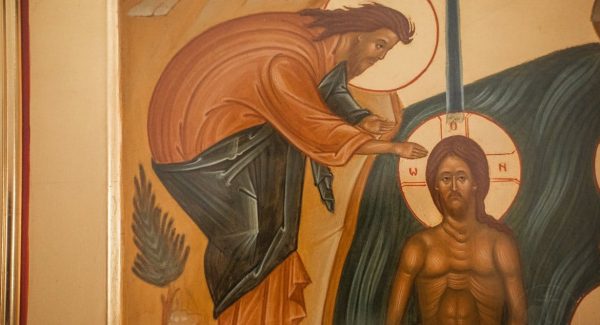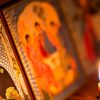Traditionally, Christians mark the moment when our Lord is revealed to the world on January 6/19. In the early days, we celebrated His birth, the visit of the Magi, and His baptism all at once – and each of these events, in its own way, is the moment at which our Lord truly comes to us. He comes to us in His incarnation, and then He is revealed to the nations through the Magi who honor Him, and finally He is proclaimed by John at His baptism. I find it so poetic and apt that “the moment” seems to happen more than once. Martha stood before our Lord and confessed, “Yes, Lord, I believe that you are the Christ, the Son of God, who is to come into the world.” (John 11:27) Even seeing Him in the flesh, Martha knows Him as the One “who is to come”, for isn’t our Lord always coming to us? Even today, our Lord is still coming to us all the time, every day, and we joyfully expect the day when He comes again.
Over the years, Christians have separated these feasts of the revelation of Christ, moving Christmas to December 25/January 7, creating a joyful twelve-day season of celebration. In the Christian East, the arrival of the Magi (now Epiphany in the West) is celebrated on Christmas, and provides a counterpoint to the angelic salutation to the shepherds, emphasizing how Christ comes for all of us: for Gentile and Jew, for the educated and the illiterate, for the rich and the poor. January 6/19 for the Orthodox Christian is Theophany, the feast of Christ’s baptism.
In his beautiful Discourse on Theophany, St. John Chrysostom explains that,
[…] Christ made Himself known to all — not then when He was born — but then when He was baptised. Until this time He was not known to the people. And that the people did not know Him, Who He was, listen about this to John the Baptist, who says: “Amidst you standeth, Him Whom ye know not of” (Jn.1:26). And is it surprising that others did not know Him, when even the Baptist did not know Him until that day? “And I — said he — knew Him not: but He that did send me to baptise with water, about This One did tell unto me: over Him that shalt see the Spirit descending and abiding upon Him, This One it is Who baptiseth in the Holy Spirit” (John 1:33).
And so John baptizes our Lord, and the Orthodox Church sings,
When You were baptized in the Jordan, O Lord
the worship of the Trinity was made manifest
for the voice of the Father bore witness to You,
calling You His beloved Son.
And the Spirit, in the form of a dove,
confirmed the truthfulness of His word.
O Christ, our God, You have revealed Yourself
and have enlightened the world, glory to You!
(Kontakion of Theophany)
For the Orthodox, January 6/19 is the day when the Holy Trinity was made manifest: human senses could take in the Father (through His voice), the Son (in the flesh) and the Holy Spirit (in the form of a dove). In this moment, the Holy Trinity is revealed to us more concretely than ever. The Son is incarnate, and now even the Father and the Holy Spirit can be heard and seen: the Holy Trinity is present in the stuff of creation.
Our Lord, in order to fulfill all righteousness, steps into the waters of the Jordan and is baptized by John. The waters of baptism wash away our sins, but Christ is without sin, so His baptism engenders the opposite: His holiness streams into the Jordan, sanctifying the waters. We see God pouring into creation in a physical way, inhabiting the very matter.
According to Orthodox tradition, at that moment, the Jordan River ran upstream; the mighty river knew its Creator and changed direction. John the Baptist, who leapt in his mother’s womb, now sees the Jordan leap at the coming of the Lord! In our icons of Christ’s baptism, the water is tumultuous and the fish are jumping. God’s creation responds to Him, recalling the Psalmist: “the sea saw and fled, the Jordan turned back”. (Psalms 114:3) The Psalms sing about how creation praises the Lord; may this echo in our hearts when we hear a waterfall singing or see an eagle soaring. All of creation praises God forever!
Let the heavens be glad, and let the earth greatly rejoice; Let the sea be shaken and all its fullness. Then the fields and everything in them shall rejoice; Then all the trees of the forest shall greatly rejoice before the face of the Lord; for He is coming […] (Psalm 96: 11-13a)
On Theophany, we celebrate His presence among us. We gather in our churches and at the shores of local waters, and we pray that He will again pour His holiness into the rivers and lakes and oceans, and into vessels of water in our churches, just as He sanctified the waters of the Jordan. We ask Him to bless these waters, and in the days to come, Orthodox priests will carry Theophany’s holy water into the homes of the faithful, to bless each of them. We invite God to be present in our world and in our homes, praying that He will come reveal Himself in our hearts.

















